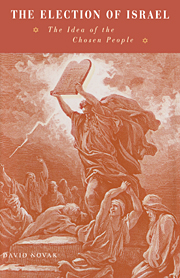Book contents
- Frontmatter
- Contents
- Preface
- List of abbreviations
- General note
- Introduction
- 1 Spinoza and his challenge
- 2 Hermann Cohen's concept of election
- 3 Franz Rosenzweig's return to the doctrine
- 4 The retrieval of the biblical doctrine
- 5 The rabbinic development of the doctrine
- 6 Two medieval views of election
- Conclusion
- Appendix 1 Some major Jewish thinkers cited
- Appendix 2
- Appendix 3
- Appendix 4
- Bibliography
- Index
Appendix 1 - Some major Jewish thinkers cited
Published online by Cambridge University Press: 18 December 2009
- Frontmatter
- Contents
- Preface
- List of abbreviations
- General note
- Introduction
- 1 Spinoza and his challenge
- 2 Hermann Cohen's concept of election
- 3 Franz Rosenzweig's return to the doctrine
- 4 The retrieval of the biblical doctrine
- 5 The rabbinic development of the doctrine
- 6 Two medieval views of election
- Conclusion
- Appendix 1 Some major Jewish thinkers cited
- Appendix 2
- Appendix 3
- Appendix 4
- Bibliography
- Index
Summary
Aha Ha' Am (1856–1927). Russian Jewish essayist and nationalist theoretician. Major influence on the revival of the Hebrew language as a vehicle for modern thought by Jews. Founder of “Cultural Zionism,” which advocated the spiritual (but nonreligious) revival of Jewish nationhood through group values. Spent last years in Palestine.
Albo, Joseph (fifteenth century). Spanish Jewish theologian and active polemicist against Christianity, especially as principal Jewish spokesman at Disputation with Catholic theologians at Tortosain 1413. Disciple of anti-Aristotelian Jewish theologian Hasdai Crescas. First Jewish thinker to use term “natural law” (dat tiv'it), which reflects influence of Thomas Aquinas. Chief work Sefer Ha' Iqqarim (Book of Roots), the most systematic Jewish theology ever written.
Buber, Martin (1878–1965). Viennese born and educated; leading German Jewish thinker. First holder of a chair in Jewish thought at a German university (Frankfurt-on-Main). Settled in Israel in 1938 and taught at the Hebrew University in Jerusalem. Considered a founder of modern religious existentialism through influence of major work I and Thou. Early proponent of Spiritual Zionism along religious, but nontraditionalist, lines. Wrote (with Franz Rosenzweig) a radical new translation of the Bible into German.
Cohen, Hermann (1842–1918). Leading German philosopher and liberal Jewish theologian. The major influence on the revival of Kant in late ninteenth- and early twentieth-century philosophy in Europe. Worked out a systematic Jewish theology through the critical appropriation of Kantian principles. Major promoter of post-Enlightenment German–Jewish synthesis. Teacher of Franz Rosenzweig.
Halevi, Judah (1075–1141). Spanish Jewish theologian and poet. In major work Kuzari argued for the superiority of revelation and tradition (of which Judaism is the epitome) over rationalist philosophy. Major influence on subsequent mystical developments in late medieval Judaism.
- Type
- Chapter
- Information
- The Election of IsraelThe Idea of the Chosen People, pp. 256 - 258Publisher: Cambridge University PressPrint publication year: 1995



